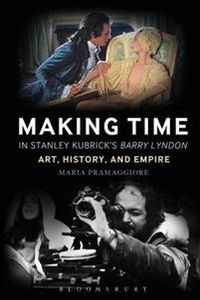
endast ny
Making Time in Stanley Kubrick's Barry Lyndon
Considered by critics to be Stanley Kubrick's masterpiece, Barry Lyndon has suffered from scholarly and popular neglect. Maria Pramaggiore argues that one key reason that this film remains unappreciated, even by Kubrick aficionados, is that its transnational and intermedial contexts have not been fully explored. Taking a novel approach, she looks at the film from a transnational perspective -- as a foreign production shot in Ireland and an adaptation of a British novel by an American director about an Irish subject. Pramaggiore argues that, in Barry Lyndon, Kubrick develops his richest philosophical mediation on cinema's capacity to mediate the real and foregrounds film's relationship to other technologies of visuality, including painting, photography, and digital media. By combining extensive research into the film's source novel, production and reception with systematic textual analysis and an engagement with several key issues in contemporary academic debate, this work promises not only to make a huge impact in the field of Kubrick studies, but also in 1970s filmmaking, cultural history and transnational film practice.
Utgiven: 2015
ISBN: 9781441198075
Förlag: Bloomsbury Academic USA
Format: Häftad
Språk: Engelska
Sidor: 224 st
Considered by critics to be Stanley Kubrick's masterpiece, Barry Lyndon has suffered from scholarly and popular neglect. Maria Pramaggiore argues that one key reason that this film remains unappreciated, even by Kubrick aficionados, is that its transnational and intermedial contexts have not been fully explored. Taking a novel approach, she looks at the film from a transnational perspective -- as a foreign production shot in Ireland and an adaptation of a British novel by an American director about an Irish subject. Pramaggiore argues that, in Barry Lyndon, Kubrick develops his richest philosophical mediation on cinema's capacity to mediate the real and foregrounds film's relationship to other technologies of visuality, including painting, photography, and digital media. By combining extensive research into the film's source novel, production and reception with systematic textual analysis and an engagement with several key issues in contemporary academic debate, this work promises not only to make a huge impact in the field of Kubrick studies, but also in 1970s filmmaking, cultural history and transnational film practice.
Ny bok
485 kr510 kr
5% studentrabatt med Studentapan
Begagnad bok (0 st)
Varje vecka tillkommer tusentals nya säljare. Bevaka boken så får du meddelande när den finns tillgänglig igen.



